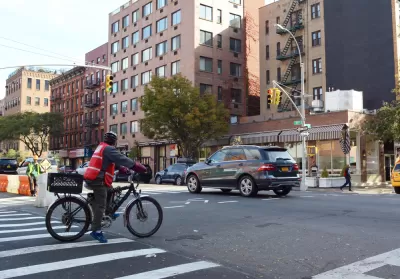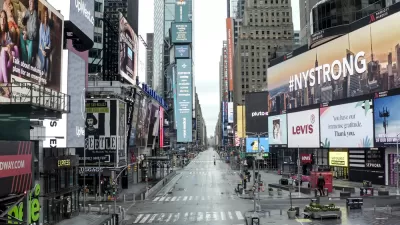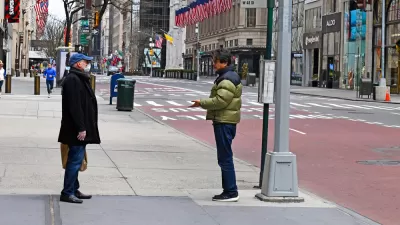For many Americans living through the social distancing and stay-at-home-orders of 2020, supporting local businesses means cutting out the tech middle man.

"To help local businesses, many of which are on the edge of going under, some people here are going out of their way to call restaurants instead of using fee-charging delivery apps," reports Heather Kelly.
Kelly's coverage of the delivery app revolt centers in the San Francisco bay Area—where residents opting out of the mobile app delivery game are opting out of many businesses headquartered in nearby cities. The terrible economic consequences of the pandemic have revealed the huge costs restaurants pay to play the delivery app game.
Giuseppe Badalamenti, owner of Chicago Pizza Boss and a restaurant consultant, posted a receipt from another restaurant he was working with that showed seemingly exorbitant fees from Chicago-based Grubhub. What started as $1,042.63 in food sales was reduced to $376.54 after Grubhub fees for delivery, commission, processing and promotions.
According to the article, customers aren't the only ones choosing to circumvent delivery apps by picking up directly from local businesses, some delivery professionals have also started taking personal delivery jobs.
The delivery app business has noticed, and some companies, like DoorDash and grubHub have changed their fee structures and have launched initiatives to provide direct support to local businesses. And despite the growing revolt, delivery services have done more business than ever since most parts of the country started staying at home in March.
FULL STORY: To save their neighborhood small businesses, people are rebelling against delivery apps

Planetizen Federal Action Tracker
A weekly monitor of how Trump’s orders and actions are impacting planners and planning in America.

Map: Where Senate Republicans Want to Sell Your Public Lands
For public land advocates, the Senate Republicans’ proposal to sell millions of acres of public land in the West is “the biggest fight of their careers.”

Restaurant Patios Were a Pandemic Win — Why Were They so Hard to Keep?
Social distancing requirements and changes in travel patterns prompted cities to pilot new uses for street and sidewalk space. Then it got complicated.

Platform Pilsner: Vancouver Transit Agency Releases... a Beer?
TransLink will receive a portion of every sale of the four-pack.

Toronto Weighs Cheaper Transit, Parking Hikes for Major Events
Special event rates would take effect during large festivals, sports games and concerts to ‘discourage driving, manage congestion and free up space for transit.”

Berlin to Consider Car-Free Zone Larger Than Manhattan
The area bound by the 22-mile Ringbahn would still allow 12 uses of a private automobile per year per person, and several other exemptions.
Urban Design for Planners 1: Software Tools
This six-course series explores essential urban design concepts using open source software and equips planners with the tools they need to participate fully in the urban design process.
Planning for Universal Design
Learn the tools for implementing Universal Design in planning regulations.
Heyer Gruel & Associates PA
JM Goldson LLC
Custer County Colorado
City of Camden Redevelopment Agency
City of Astoria
Transportation Research & Education Center (TREC) at Portland State University
Camden Redevelopment Agency
City of Claremont
Municipality of Princeton (NJ)





























